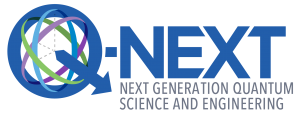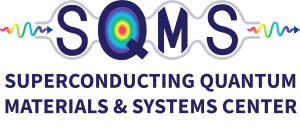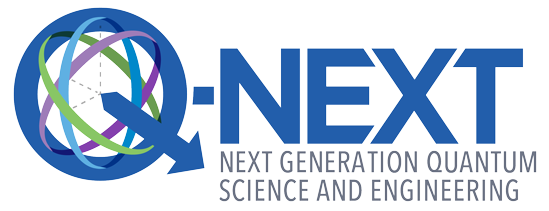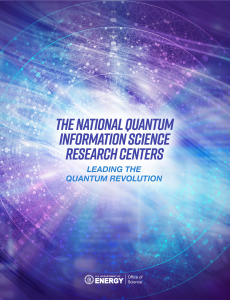DOE National QIS Research Centers
Q-NEXT is one of five U.S. Department of Energy National Quantum Information Science (QIS) Research Centers, which constitute the first large-scale QIS effort that crosses the technical breadth of the DOE Office of Science.
The aim of the centers, coupled with DOE’s core research portfolio, is to create and to steward the ecosystem needed to foster and facilitate advancement of QIS, with major anticipated national impact on national security, economic competitiveness and America’s continued leadership in science.
Led by a DOE national laboratory, each center incorporates a collaborative research team of labs, universities, and private companies that span multiple scientific and engineering disciplines. In addition, each center seamlessly integrates the science and technology innovation chain to accelerate progress in QIS research and development, to facilitate technology transfer, and to build the quantum workforce of the future.
Together, the five centers are developing technologies that go beyond what was previously imaginable.
View the National QIS Center brochure. Learn more about the centers at the Department of Energy.

Co-design Center for Quantum AdvantageDirector: Andrew Houck C2QA aims to overcome the limitations of today’s noisy intermediate scale quantum (NISQ) computer systems to achieve quantum advantage for scientific computations in high-energy, nuclear, chemical and condensed matter physics. The integrated five-year goal of C2QA is to deliver a factor-of-10 improvement in each of software optimization, underlying materials and device properties, and quantum error correction, and to ensure these improvements combine to provide a factor of 1,000 improvement in appropriate computation metrics. |

Q-NEXTDirector: David Awschalom Q-NEXT will create a focused, connected ecosystem to deliver quantum interconnects, to establish national foundries, and to demonstrate communication links, networks of sensors, and simulation testbeds. In addition to enabling scientific innovation, Q-NEXT will build a quantum-smart workforce, create quantum standards by building a National Quantum Devices Database, and provide pathways to the practical commercialization of quantum technology by embedding industry in all aspects of its operations and incentivizing start-ups. |

Quantum Science CenterDirector: Travis Humble QSC is dedicated to overcoming key roadblocks in quantum state resilience, controllability, and ultimately scalability of quantum technologies. This goal will be achieved through integration of the discovery, design, and demonstration of revolutionary topological quantum materials, algorithms, and sensors, catalyzing development of disruptive technologies. In addition to the scientific goals, integral to the activities of the QSC are development of the next generation of QIS workforce by creating a rich environment for professional development and close coordination with industry to transition new QIS applications to the private sector. |

Quantum Systems AcceleratorDirector: Irfan Siddiqi QSA will catalyze national leadership in quantum information science to co-design the algorithms, quantum devices, and engineering solutions needed to deliver certified quantum advantage in scientific applications. QSA brings together dozens of scientists who are pioneers of many of today’s unique quantum engineering and fabrication capabilities. |

Superconducting Quantum Materials and Systems CenterDirector: Anna Grassellino The primary mission of SQMS is to achieve transformational advances in the major crosscutting challenge of understanding and eliminating the decoherence mechanisms in superconducting 2D and 3D devices, with the goal of enabling construction and deployment of superior quantum systems for computing and sensing. In addition to the scientific advances, SQMS will target tangible deliverables in the form of unique foundry capabilities and quantum testbeds for materials, physics, algorithms, and simulations that could broadly serve the national QIS ecosystem. |

